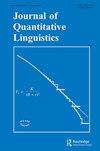英汉词汇结构的协同特性
IF 1.7
2区 文学
0 LANGUAGE & LINGUISTICS
引用次数: 0
摘要
协同词汇模型为探索语言词汇属性之间的相互关系提供了一个独特的框架。以往对该词汇模型的几个特性的研究已经获得了许多成功的拟合结果,但对该模型的一个主要特性同义性的研究却很少。本研究使用从汉英语料库、词典和同义词典中检索到的825个汉语和848个英语标记,对比研究了该词汇模型的四个主要属性:词长、词频、多义和同义词之间的相互关系。尽管英语属于日耳曼语系,而汉语属于汉藏语系,但两种语言的成功匹配表明了协同词汇模式的跨语言有效性。此外,我们对拟合结果的参数分析表明,与英语相比,汉语对词长缩短的抵抗更强,对语义变化的响应更快。本文章由计算机程序翻译,如有差异,请以英文原文为准。
Synergetic Properties of Lexical Structures in Chinese and English
ABSTRACT The synergetic lexical model provides a unique framework for exploration of the interrelationships between the lexical properties of languages. Previous studies concerning several properties of this lexical model have yielded many successful fittings results, but very few studies have investigated synonymy, a major property of this model. The present study uses 825 Chinese and 848 English tokens retrieved from Chinese and English corpora, dictionaries, and thesaurus to conduct a contrastive study on the interrelations between four major properties of this lexical model: word length, word frequency, polysemy, and synonymy. The successful fittings of both languages demonstrate the cross-linguistic validity of the synergetic lexical model, though English belongs to the Germanic language family, while Chinese, a highly analytical language, is of the Sino-Tibetan language family. Moreover, our analysis of the parameters of the fitting results shows that, compared to English, Chinese possesses a greater resistance to shortening word length and a quicker response to semantic change.
求助全文
通过发布文献求助,成功后即可免费获取论文全文。
去求助
来源期刊

Journal of Quantitative Linguistics
Multiple-
CiteScore
2.90
自引率
7.10%
发文量
7
期刊介绍:
The Journal of Quantitative Linguistics is an international forum for the publication and discussion of research on the quantitative characteristics of language and text in an exact mathematical form. This approach, which is of growing interest, opens up important and exciting theoretical perspectives, as well as solutions for a wide range of practical problems such as machine learning or statistical parsing, by introducing into linguistics the methods and models of advanced scientific disciplines such as the natural sciences, economics, and psychology.
 求助内容:
求助内容: 应助结果提醒方式:
应助结果提醒方式:


